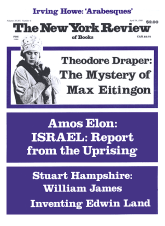In response to:
Time's Settlement from the March 12, 1987 issue
To the Editors:
In his review of Ronald Dworkin’s Law’s Empire [NYR, March 12, 1987] Professor Grey writes:
The judiciary and its surrounding corps of lawyers and commentators serve not as philosopher-kings, but as interpreters of the community’s traditions and ideals, and thus as critics of its practices that are not congruent with a coherent scheme of value for governing its common life. They are experts in integrity, in making society more consistently what it already is. They are not experts in what is ultimately right and wrong, though their conceptions of justice enter into their work as the conceptions of justice of legislators and administrators enter into theirs. Thus Judge and Company were not meant to have the power to make slavery universally enforceable in a society founded on a compromise that established it half slave and half free, as the Supreme Court tried to do in the Dred Scott case. But the judges would also have gone beyond their authority had they tried to abolish slavery before the Civil War as well.
There is I think a serious misunderstanding of Dworkin’s position here. If I am correct, Dworkin is very much committed to the claim in Law’s Empire that commitment to integrity would require declaring slavery unconstitutional, even prior to the fourteenth amendment. Why? Because to be committed to law as integrity is to be committed to the following two step procedure: first, to identifying whatever principles of justice, fairness, or due process we claim already lie behind and so guide our reading of existing statute; second, to extending or applying these principles to whatever new cases arise in such a way so that we produce the most coherently principled “narrative of law” possible. (Should our justificatory readings of statute generate conflicting principles, law as integrity requires we identify what the best interpretation of our legal tradition as a whole locates as the more central or explanatorily final, structuring the force or scope of competing principles accordingly.) It is true that integrity and justice are conceptually distinct as norms, but clearly, if our legal tradition happens to be animated by principles that are themselves just to begin with, then commitment to integrity must necessarily bring about a more just version of this legal tradition. So: on Dworkin’s view, if the various articles of the Constitution must be interpreted against or as animated by certain principles, principles affirming say the equality of all persons, or the rights of all persons to due process—as is surely the case—then we must also say first, that our law already acknowledges or contains these principles, and second, that integrity requires nothing less than that we extend this acknowledgement “to its natural limit” (Dworkin’s phrase). This in turn would of course entail finding slavery illegal.
Steven Ross
Hunter College/CUNY
New York City
Thomas C Grey replies:
Professor Ross raises what is really a point of antebellum American constitutional law, and his reading of the original Constitution is a piece of bicentennial romanticism. The Constitution presupposed and protected slavery in several of its clauses, and even the abolitionists accepted, with near unanimity, that in its unamended form it left the decision whether or not to have slavery to the states. Antislavery lawyers directed their constitutional arguments against the extension of slavery to the territories, and against the Fugitive Slave Law.
If Dworkin’s theory committed him to the conclusion that the Constitution invalidated slavery as it existed in the original southern states, that would count very strongly against its adequacy as a general account of law. But the theory requires no such utopian interpretation of our slavery-ridden founding document and its early development. Dworkin requires legal conclusions to meet a threshold test of “fit” with the existing legal data—that is what differentiates law from moral and political philosophy. The requirement of fit would have ruled out the conclusion that slavery violated the federal Constitution before enactment of the Thirteenth Amendment (not the Fourteenth, as Professor Ross has it).
In his book, Dworkin mentions the Constitution’s slavery provisions, in particular the famous three-fifths clause, as violations of “integrity” or internal consistency. But his discussion presupposes that those provisions had legal effect. The Constitution is a piece of legislation, and Dworkin recognizes that legislation may and often does violate integrity as well as justice without losing its character as law.
This Issue
April 14, 1988



